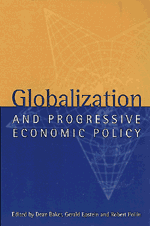Book contents
- Frontmatter
- Contents
- List of figures
- List of tables
- List of contributors
- Editors' acknowledgments
- 1 Introduction
- I The IMF, the World Bank, and neo-liberalism
- II Foreign direct investment, globalization, and neo-liberalism
- III Globalization of finance
- IV Trade, wages and the environment: North and South
- 10 Openness and equity: regulating labor market outcomes in a globalized economy
- Comment by Jaime Ros
- 11 Integration and income distribution under the North American Free Trade Agreement: the experience of Mexico
- Comment by Thea Lee
- 12 Malthus redux? Globalization and the environment
- Comment by Peter Dorman
- V Migration of people in a global economy
- VI Globalization and macroeconomic policy
- Bibliography
- Index
11 - Integration and income distribution under the North American Free Trade Agreement: the experience of Mexico
Published online by Cambridge University Press: 04 August 2010
- Frontmatter
- Contents
- List of figures
- List of tables
- List of contributors
- Editors' acknowledgments
- 1 Introduction
- I The IMF, the World Bank, and neo-liberalism
- II Foreign direct investment, globalization, and neo-liberalism
- III Globalization of finance
- IV Trade, wages and the environment: North and South
- 10 Openness and equity: regulating labor market outcomes in a globalized economy
- Comment by Jaime Ros
- 11 Integration and income distribution under the North American Free Trade Agreement: the experience of Mexico
- Comment by Thea Lee
- 12 Malthus redux? Globalization and the environment
- Comment by Peter Dorman
- V Migration of people in a global economy
- VI Globalization and macroeconomic policy
- Bibliography
- Index
Summary
Introduction
When a developing country liberalizes trade and investment, what is the effect on growth, income distribution, and the possibilities for achieving a more equitable society? And to what extent does liberalization accelerate technical progress and thereby enhance national economic independence? Drawing on the experience of Mexico under the North American Free Trade Agreement (NAFTA), the evidence suggests that, for developing countries, the benefits of liberalization are smaller and the costs higher than is generally claimed. A major reason why standard theory and many predictions have overstated these benefits in the case of NAFTA is that they overlook technology differences between developing countries and their richer trading partners. The consequences of technology differences, this chapter will argue, are that the benefits of liberalization fall less to wages and more to profits than is generally predicted. The consequences of liberalization for technical progress are mixed, and the influence of foreign capital tends to grow. And, by committing a nation to a competitive battle for foreign investment, liberalization also tends to undermine labor rights and working conditions, as well as many social programs and environmental protections.
Before embarking on this analysis, though, a few words on globalization are in order. Globalization is often talked about as if it were inexorable, and as if the only choice we faced were how to respond to it. In fact, however, globalization has two main components.
- Type
- Chapter
- Information
- Globalization and Progressive Economic Policy , pp. 273 - 292Publisher: Cambridge University PressPrint publication year: 1998
- 7
- Cited by



